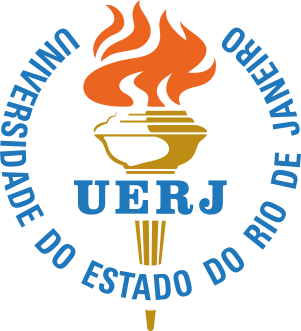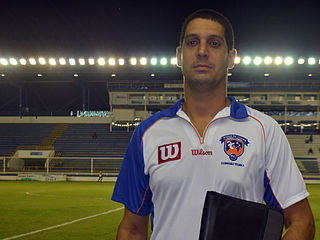
The Federal University of Rio de Janeiro (UFRJ), alternatively known as University of Brazil, is a public research university in Rio de Janeiro, Brazil. It is the largest federal university in the country and is one of the Brazilian centers of excellence in teaching and research.

Duque de Caxias is a city on Guanabara Bay and part of Rio de Janeiro metropolitan area, southeastern Brazil.

Guanabara Bay is an oceanic bay located in Southeast Brazil in the state of Rio de Janeiro. On its western shore lie the cities of Rio de Janeiro and Duque de Caxias, and on its eastern shore are the cities of Niterói and São Gonçalo. Four other municipalities surround the bay's shores. Guanabara Bay is the second largest bay in area in Brazil, at 412 square kilometres (159 sq mi), with a perimeter of 143 kilometres (89 mi).

Rio de Janeiro State University is a public research university in the state of Rio de Janeiro, Brazil. It is one of the largest and most prestigious universities in the country. The university's law and medical schools are among the best in the nation. Its Biology, Social Science, Nursing and Philosophy courses are also highly praised, as stated by Guia do Estudante.

Eduardo Allax Scherpel, sometimes known as just Eduardo is a Brazilian professional coach and former player.

The Catholic University of Petrópolis is a private and non-profit university in Petrópolis — the capital of the State of Rio de Janeiro for nine years and the largest city of the highlands of the state. It is maintained by the Catholic Archdiocese of Petrópolis. The university had the highest score in the state of Rio de Janeiro in the National Student Performance Exam assessment for the bachelor's degree in Physiotherapy (undergraduate) and the third highest score in the bachelor's degree in Biomedicine (undergraduate). With that result, UCP is the best evaluated private university in the state in the respective courses. UCP Law School is one of the only ones recommended by the National Bar Association of Brazil in the region.

The Meriti is a river in Rio de Janeiro state in south-eastern Brazil.

Serviço Social do Comércio, also known by the acronym SESC, is a Brazilian non-profit private institution, kept by businessmen in the trade of goods, services and tourism. It has operations in all Brazil, aimed primarily for the welfare of their employees and family but open to the general community.
Euvaldo Lodi Institute of Rio de Janeiro is the equivalent of the Brazilian Euvaldo Lodi Institute, created by the National Confederation of Industry along with the Industry Social Service (SESI) and the National Industrial Training Service in 1969. Except it only covers Rio de Janeiro state, instead of all the Brazilian territory.
The National Industrial Training Service of the State of Rio de Janeiro is SENAI's institution that serves the state. The organization works with vocational education and technological innovation in the industry of Rio de Janeiro state. It promotes the technology training of industry professionals with focus on professional practice, seeking to supply the demand for employees with higher training and ability to innovate in processes and products.
The Industry Federation of the State of Rio de Janeiro (FIRJAN) is a Brazilian industrial federation from the state of Rio de Janeiro that acts as a representative of the state's industries at municipal, state and national levels. The organization, one of the five that comprehend the FIRJAN System, also promotes debates and produces researches, studies and projects aiming Rio de Janeiro's sustainable development. The provision of services to companies affiliated to it targets the industrial, social and economic growth of Rio de Janeiro state.
SESI Mathematics is a project developed by FIRJAN System with the aim of improving the teaching of math for high school students. The program consists of a series of initiatives, from the organization of training courses for teachers and distribution of educational kits, to the providing of physical spaces for students of SESI Rio and SENAI Rio network, as well as for those from selected state schools. Although the project has the pretension of being expanded to other Brazilian states, nowadays it only operates in the states of Rio de Janeiro and Bahia.
SESI Citizenship is a Brazilian program that aims to bring education, sports, leisure and culture to all pacified communities in the state of Rio de Janeiro, i.e., those that already have the Pacifying Police Units (UPPs). Created in August 2010, the program has already held about a million attendances in dozens of communities and was awarded the prize "Citizenship Personality 2013", granted to individuals and institutions who "contribute to the defense of civil rights, the strengthening of social promotion policies and the ethical values."
The Federal University of Southern and Southeastern Pará is a multi-campus public university, based in the city of Marabá, with campuses in Santana do Araguaia, São Félix do Xingu, Rondon do Pará and Xinguara. The legislation that created the institution was sanctioned on June 5, 2013 by President Dilma Rousseff.
FIRJAN System is a network of private nonprofit organizations with more than ten thousand associates. Its mission is to promote business competitiveness, education and quality of life of industrial workers and the whole society, in the state of Rio de Janeiro. FIRJAN System consists of five institutions that work in an integrated manner for the growth of the industry of RJ. Together, FIRJAN, Industrial Center of Rio de Janeiro (CIRJ), Industry Social Service of the State of Rio de Janeiro, National Industrial Training Service of the State of Rio de Janeiro and Euvaldo Lodi Institute of Rio de Janeiro promote actions in economic, political and social levels to ensure a prominent position to the state on the national scenery. Today, all institutions act as service providers to enterprises and society.
Alfredo Sampaio is a Brazilian football coach and former player. He is the current head coach of Sampaio Corrêa-RJ.
Renata Carvalho is a Brazilian actress, playwright and theater director. She is from the city of Santos in São Paulo and began her career in the 1990s. She is trained in social sciences, and has dubbed herself a transpologist, a combination of the terms transgender and anthropologist to describe her work on trans experiences and bodies.
The Sistema de Seleção Unificada is a digital platform launched in January 2010 and developed by the Brazilian Ministry of Education (MEC). It is used by students who attended the National High School Exam to apply to higher education institutions that use ENEM scores as a method of admission. From 2024, the system will be limited to one edition per year, which will be held in January.
The Municipal Youth Secretariat (SEJUV) is a public administration body of Campo Grande, whose main objective is to develop public policies aimed at the city's youth. Currently, the youth secretary is Michele Ferreira, who took over the position after Maicon Nogueira left to run in the Campo Grande municipal elections in 2024.







